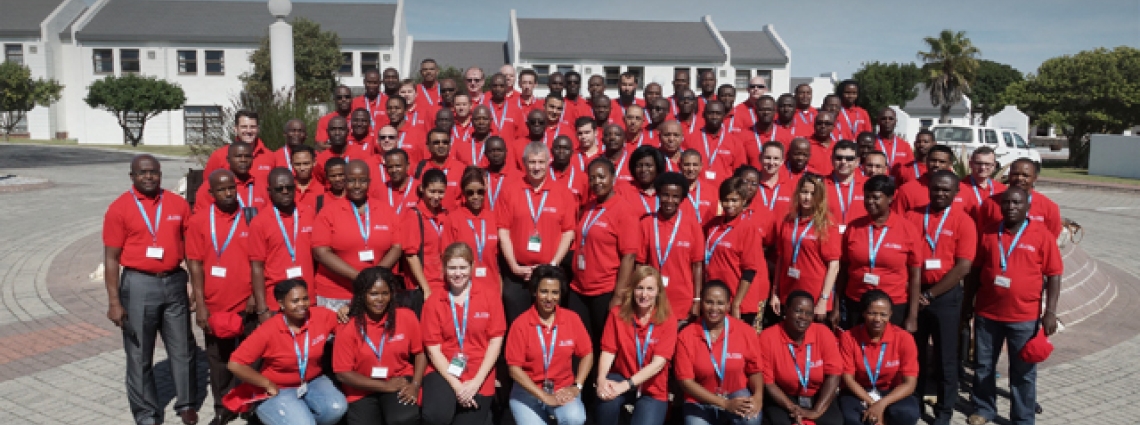OSI regional introductory training course in South Africa
From 10 to 17 April 2016, South Africa hosted an on-site inspection (OSI) regional training course at the Denel Overberg Test Range at Arniston, Western Cape South Africa. The course aimed to familiarize experts from Africa with OSI concepts, technologies, and operations.
An OSI is the final verification measure to verify compliance with the Comprehensive Nuclear-Test-Ban Treaty (CTBT). During an OSI, up to 40 experts are deployed to search on the ground for signs of a fresh nuclear explosion, using up to 17 different OSI techniques. An OSI can be requested by any Member State and will be possible once the CTBT has entered into force.
An OSI is the final verification measure to verify compliance with the Comprehensive Nuclear-Test-Ban Treaty (CTBT). During an OSI, up to 40 experts are deployed to search on the ground for signs of a fresh nuclear explosion, using up to 17 different OSI techniques. An OSI can be requested by any Member State and will be possible once the CTBT has entered into force.
It was the first time for me to participate in a CTBTO training and it was amazing. The exercises were really educative, especially the table-top exercise.
Participants from 33 African countries took part in the course: from Algeria, Angola, Botswana, Burkina Faso, Burundi, Cameroon, Chad, Comoros, Congo, Democratic Republic of the Congo, Egypt, Ethiopia, Gabon, Ghana, Ivory Coast, Kenya, Libya, Madagascar, Malawi, Mali, Mozambique, Namibia, Niger, Nigeria, Sao Tome and Principe, Senegal, South Africa, Sudan, Tanzania, Tunisia, Uganda, Zambia, and Zimbabwe. Facilitators from Austria, Iraq, and Israel, as well as from the CTBTO participated.
This course allowed me to better understand this important pillar of the CTBTO verification regime in all its legal and technical aspects. Such knowledge will help me to better achieve my task while representing my country in meetings such as Working Group B of the CTBTO.
Training was carried out in an interactive manner and makes use of preparatory e-learning modules, brief lectures, practical hands-on training sessions, equipment demonstrations, table top exercises, and a field exercise providing the opportunity to apply expertise gained in a practical manner.
We learn from working together in the field and beyond. We need to join all our forces, collaborate, and work as a team.
Hands-on training to familiarize participants with OSI equipment played an important role. To that end, seven tonnes of OSI equipment were made available including communication devices, scientific measuring equipment, visual observation kits, a gamma radiation portal monitor, a field information management system, a decontamination line, personal protective equipment, and much more for the realisation of this event.
This first introductory course hosted in Africa brought together over 70 participants from different African countries. No doubt, the course has raised both the awareness and the momentum of the CTBTO and its activities, particularly regarding on-site inspections.
The course was hosted by the government of South Africa in collaboration with Council for Geosciences and the South African Council for the Non-Proliferation of Weapons of Mass Destruction. The Denel Overberg Test Range provided preparatory, logistical, and administrative assistance.
This course will allow me to be more proactive and more efficient in the coming CTBTO meetings, in particular the negotiation of the OSI draft Operational Manual in Working Group B. I want to express my appreciation and gratitude to the whole team of the OSI Division and the host country.
As in the last major OSI exercise in Jordan in 2014, the Integrated Field Exercise IFE14, safety measures played an important role. Participants were trained in the use of personal protective equipment and the decontamination line that play part of any OSI inspection’s base of operations.
South Africa and the CTBTO
South Africa hosts five CTBTO monitoring facilities – more than any other country in Africa. It was amongst the first countries to sign and ratify the CTBT, on 24 September 1996 and 30 March 1999 respectively. See country profile page for more information.
South Africa and the CTBTO
South Africa hosts five CTBTO monitoring facilities – more than any other country in Africa. It was amongst the first countries to sign and ratify the CTBT, on 24 September 1996 and 30 March 1999 respectively. See country profile page for more information.
20 Apr 2016
